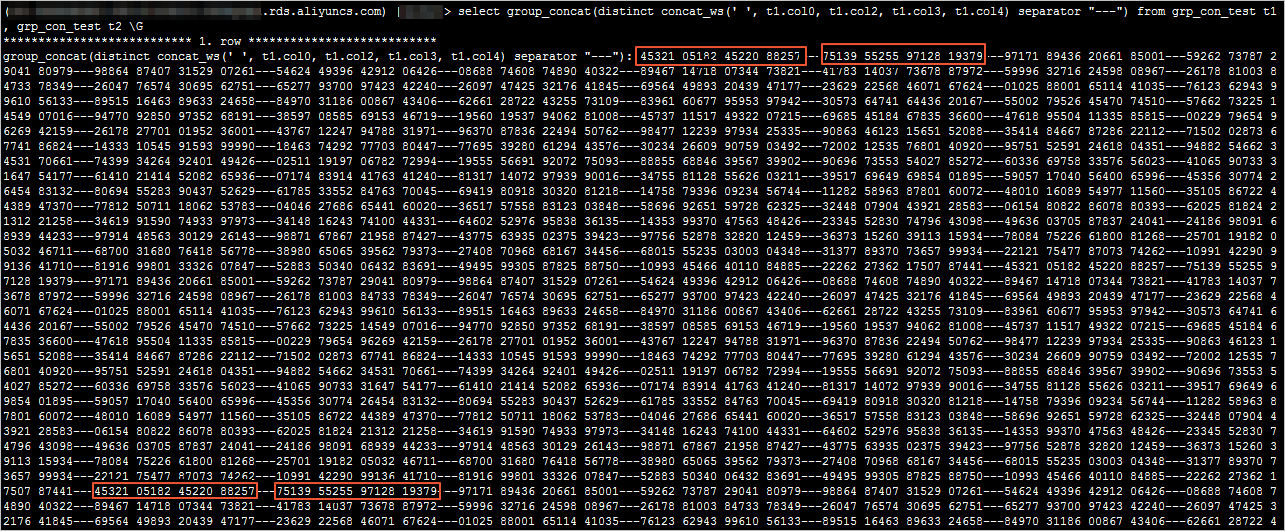本文介绍RDS MySQL函数group_concat相关问题。
group_concat返回结果的长度
函数group_concat返回结果的长度受参数group_concat_max_len控制,默认值为1024,即默认返回1024字节长度结果。
参数名称 | 默认值 | 取值范围 | 说明 |
group_concat_max_len | 1024 | 4-1844674407370954752 | group_concat函数返回结果的最大长度,单位:Byte。 |
说明
您可以设置参数group_concat_max_len在全局生效或会话级别生效:
全局生效:在控制台的参数设置页面修改。
会话级别生效:
set group_concat_max_len=90; -- 设置当前会话 group_concat_max_len 为 90 字节 show variables like 'group_concat_max_len'; -- 查看当前会话的 group_concat_max_len 值 select group_concat(distinct concat_ws(' ', t1.col0, t1.col2, t1.col3, t1.col4) separator "---") from grp_con_test t1, grp_con_test t2 \G -- 查询结果 select length(group_concat(distinct concat_ws(' ', t1.col0, t1.col2, t1.col3, t1.col4) separator "---")) from grp_con_test t1, grp_con_test t2 \G -- 查询结果的长度
group_concat(distinct) 去除重复数据失效的处理
失效原因
当设置group_concat_max_len为较大值时,使用group_concat(distinct)去除结果中的重复数据,会出现失效的情况,例如:
select group_concat(distinct concat_ws(' ', t1.col0, t1.col2, t1.col3, t1.col4) separator "---")
from grp_con_test t1, grp_con_test t2 \G -- 查询结果
可以看到,结果中出现了多个重复值。出现这个问题的原因当group_concat返回结果集比较大,会出现内存临时表无法承载全部结果集数据,进而会使用磁盘临时表;而group_concat在使用磁盘临时表时会触发BUG导致无法去除重复数据。
解决方法
调整tmp_table_size参数设置,增大内存临时表的最大尺寸,命令如下:
set tmp_table_size=1*1024*1024 -- 设置当前会话 tmp_table_size 为 1 MB
show variables like 'tmp_table_size' -- 查看当前会话 tmp_table_size 的设置
select group_concat(distinct concat_ws(' ', t1.col0, t1.col2, t1.col3, t1.col4) separator "---")
from grp_con_test t1, grp_con_test t2 \G说明
您也可以在控制台的参数设置页面修改参数tmp_table_size。
group_concat和concat结合使用返回异常
异常原因
group_concat和concat结合使用某些情况下会出现返回BLOB字段类型的情况,例如:
select concat('{' ,group_concat(concat('\"payMoney' ,t.signature ,'\":' ,ifnull(t.money,0))) ,'}') payType
from my_money t
where cash_id='989898989898998898'
group by cash_id;
这是由于函数concat按字节返回结果,如果concat的输入有多种类型,其结果是不可预期的。
解决方法
通过cast函数进行约束,使concat返回结果为字符串类型,将上面示例修改为:
select concat('{' ,cast(group_concat(concat('\"payMoney' ,t.signature ,'\":' ,ifnull(t.money,0))) as char) ,'}') payType
from my_money y t
where cash_id='989898989898998898'
group by cash_id;
该文章对您有帮助吗?